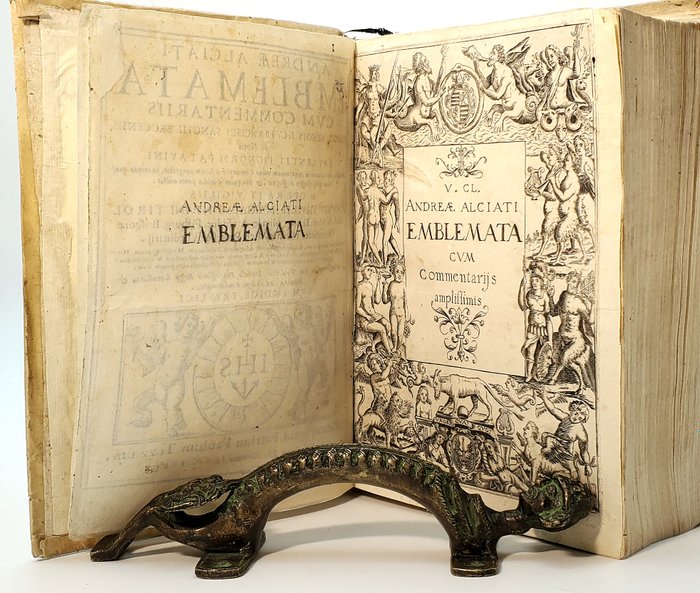
Nicolas, Sieur Despreaux Boileau - Oeuvres diverses avec le Traité du sublime ou du merveilleux dans le discours - 1674
編號 37204529

編號 37204529

Emblemata (Emblematum liber) by Andrea Alciato is the founding work of an entire literary genre. The first book of Emblems, which will have considerable popularity in the humanistic and Renaissance culture of the whole of Europe.
Padova, 1621 - Tozzi ma in realtà Laurentii Pasquati.
Glasgow University: "The Padua edition of 1621 is usually considered the final and most complete edition of the Emblematum liber or Emblemata by Alciato. The corpus eventually extends to 212 emblems, but the first editions had just over a hundred."
Wikipedia: "The most complete and best known edition is the one published in Padua in 1621 with comments by Claude Mignault and Francisco Sánchez de las Brozas and notes by Lorenzo Pignoria."
Novissima hac editione in continuam unius commentarij seriem congestius.opera et vigiliis Ioannis Thuilii Mariaemontani tirol.Opus copiosa sententiarum, apophthegmatum adagiorum, fabularum mythologiarum, hieroglyphicorum.varietate instructum e exornatum.Patavij (Padova), apud Petrum Paulum Tozzium (in fine: Typ. Laur. Pasquati), 1621.
4to, pp. LXXX, 1003, (1). Full parchment binding with gold titles and decorations on the spine. Illustrated title, typographic brand on the cover page, another large typographic brand at the end. Text on two columns in round and italic lettering, passages in Greek. A good copy with full margins, pencil inscription specular to the title on page II, woodworm holes and some restored defects on a few pages at the end.
It is the richest edition for the number of emblems and for the philological apparatus ("for the further history of the text should be remembered the Padua edition of 1621 which includes 212 emblems and in which are reproduced the various extensive comments that had developed around the work, mainly that of the French Claude Mignault", see. D.B.It. II, p. 72); It is also sought for the presence of emblem No. LXXX, which depicts a woman defecating in a vase of gold, stigmatising same-sex relationships.
Extremely vulgar ("Adversus naturam peccantes"), almost always missing in previous editions.
Spirit of the work.
The word "emblemata" is the plural of the Greek word "emblema", a term that indicates a decorative element, a mosaic or an ornament: in its preface to Peutinger, Alciato describes his emblems as a learned fun, a pastime for humanists imbued with classical culture.
In this regard, as the preface reads, in the Italian translation:
«Mentre i bambini si divertono con le nocciole e i giovani con i dadi, così giocare a carte riempie il tempo dei pigri. Nella stagione delle feste noi elaboriamo questi emblemi, fatti dalla nobile mano degli artigiani. Proprio come si aggiungono guarnizioni agli abiti e distintivi ai cappelli, così si addice a ognuno di noi scrivere segni muti. Anche se il supremo imperatore può darti preziose monete e finissimi oggetti antichi, io do a te, poeta a un altro poeta, doni di carta: prendi questi, Konrad, segno del mio amore.»
Literary fame.
Alciato's work had thousands of imitations in all European vernacular languages: profane, religious or amorous, the books of emblems were an integral part of European culture for two centuries.
Abebooks: 19th-century binding - US$ 2,485.61 (EUR 2.200,00).